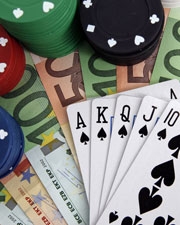Global Economy and Gambling
|
Technological progress, globalization, social trends and especially the recent and still ongoing economic crisis are at the source of both land based and online gambling rehabilitation. Originally a niche market of low economic importance, gambling has become a mainstay of the economies of several countries, while in many others it is seen as a possible lifeline and end to their current economic crises.
The days when we considered the Principality of Monaco as an exception are gone. With its famous Monte-Carlo casino, probably the most prestigious in the world, the tiny Mediterranean state could afford to not tax its citizens thanks to the revenues generated from the casino. For many years Monaco was the only place where gambling was of central importance in economic terms.
|
 |
The economic importance of Gambling is increasing
Today in some countries the live gambling industry is a main economic source, such as in Macau. It can also be a major economic factor as it is in Las Vegas and in all cities which are home to casinos.
All types of lotteries, instant lotteries and bets considered games of chance are typically managed by the state, usually by monopolies that send the proceeds to the government. This taxation allows countries to finance various special projects like education, or simply to enlarge the state budget. Lotteries, therefore, have long held a major economic influence on different countries’ national finances.
Online gambling is increasingly popular
Technological progress, initially because of television and later thanks to personal computers, has helped spread both the game of poker and all types of gambling. The availability of games on the Internet has exponentially increased the number of players in the virtual world, sometimes at the expense of real casinos.
|
The economic weight of online gambling - casino, poker and online bets - negligible until a few years ago, has become significant.
|
Online Gambling: tens of billions dollars generated annually
With the spread of Internet games, the economic weight of online gambling - casino, poker and online bets - negligible until a few years ago, has become significant.
The governments of various countries have attempted to prevent access by their citizens to services offered by foreign gambling sites, usually located in tax havens, for years. No technological or legal means, however, were able to prevent fans from connecting to online casino, betting and poker sites. From an economic standpoint, this has caused a double loss to the state coffers: the flight of private capital resulting from the money invested by players while gaming, and the non-taxation of businesses which have instead registered in foreign countries.
|
|
Governments change their attitude towards gambling online
"If you can’t beat them, join them." This is perhaps the conclusion to which most of the governments have arrived in regards to collecting taxes from the various activities related to gambling. Countries are changing their attitudes, and the economic crisis has helped accelerated a need to do so.
This is especially true in the matter of online poker, which is not only the largest sector, but also has largest market growth. A good dose of hypocrisy - suddenly, poker has become a game of skill par excellence - combined with the desire and the need to find new funding for state coffers depleted by the economic crisis, and "les jeux sont fait.”
Gradually, the majority of European states, many of which were the most reluctant to open their markets to online gambling industry, are changing their laws to allow foreign operators to open legal gambling sites. The solution is always a middle road. Governments receive taxes from operators, albeit less than they do from lotteries, while operators conquer new market segments. The operators offset the taxes by being able to offer games to a larger market.
|

|
An important case study comes from the Italian market, which undoubtedly influenced the decisions of other European countries. The Italian online poker market, initially estimated at 400 million Euros a year, has exceeded one billion Euros after 12 months of activity. The discovery of this golden goose has caused other European governments to once again think about online poker legalization.
Even in the U.S. online bets, poker and casino games are being called upon to help the economy. Since President Obama’s election, he has not yet had time to deal with the American online gambling legalization, due to more urgent issues. To expedite things, the American pro gambling lobby has recently launched a plan to regularize and legalize gambling online as soon as possible to help fund health care reform, one of Obama’s election promises.
What lies ahead for online gambling?
Despite the fact that many countries still are trying to filibuster the access to foreign online gambling sites, the number of governments that have decided to legalize the industry is steadily increasing. The inability to block access to sites deemed illegal and the need to find new funding for state coffers will most likely continue to increase the number of countries regularizing online gambling activities even further.
Author: Casino-online.com
|

